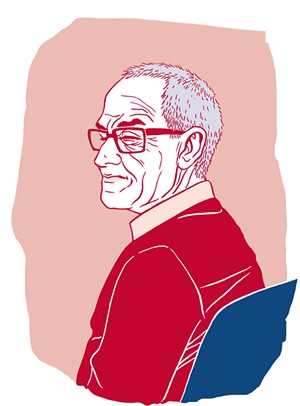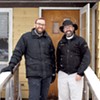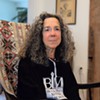Published January 21, 2015 at 10:00 a.m.
After a two-year investigation, an unusual trial began in federal court last week based on allegations that a local refugee concealed crimes he committed during the Bosnian War. But for all the hours of testimony and hundreds of pages of evidence, one question has barely been addressed: Who is Edin Sakoc?
Prosecutors say that Sakoc raped one woman and assisted in the murders of two others during the ethnic bloodshed in Bosnia in 1992, and lied about it to gain U.S. citizenship. In U.S. District Court in Burlington, witnesses for the prosecution have described a man who stood idly by while his comrade shot two women and then helped drag their corpses outside to be burned.
Other evidence suggests that Sakoc, 55, is an unremarkable man who led a modest life in Bosnia and settled into domesticity in Vermont. Court documents describe Sakoc — pronounced "Sah-Coach" — as a former janitor and stay-at-home dad who likes fishing, gardening and cooking meals for friends.
"While the terms 'war crime,' and 'war criminal' conjure up images of old men living out their lives comfortably in South American countries, this image does not apply to Mr. Sakoc," Sakoc's attorneys said in a court filing. "It is an image born of the Nazi war criminals who fled Europe at the end, and after, World War II. Such men had money and forged documents provided by third parties ... he moved here under his real name and has been living in plain sight."
The U.S. Department of Justice in recent years has prosecuted a few Bosnian and Rwandan refugees for crimes committed abroad, but such cases are almost unheard of in Vermont. Burlington immigration attorney Leslie Holman said she is unaware of local authorities prosecuting any refugees for crimes related to actions that occurred in their native countries.
"It's not dime a dozen — I certainly have not seen it in Vermont," said Holman, who is president of the American Immigration Lawyers Association.
Acting Vermont U.S. Attorney Eugenia Cowles acknowledged her office rarely prosecutes immigration fraud cases, but declined further comment. The trial was still under way as of press time.
Sakoc, a Burlington resident, faces 10 years in prison and deportation if convicted on two charges that he falsified his citizenship application by not disclosing his participation in the alleged acts of violence. He does not have a criminal record and is not facing any charges from Bosnian or international courts. He has returned to Bosnia — where he still owns a home — half a dozen times since moving to the U.S.
Now defense attorneys say Sakoc has no money, and a judge last year allowed him to be released from prison, apparently convinced that he wouldn't flee before trial. It likely helped that a number of people from the Vermont refugee community wrote letters of support for Sakoc. Many noted that he has friends from varying ethnic backgrounds.
Investigators have not explained during the trial or in court documents how they learned of Sakoc's alleged crimes or what triggered the investigation. But they traveled to Bosnia last year to videotape witnesses whose testimonies were projected — and translated — last week in court. A spokesman said the U.S. Justice Department does not track the cost of trials.
As prosecutors laid out their case, Sakoc sometimes seemed to be a supporting character at his own trial. Most of the testimony focused not on the accused, but on fellow soldier "Boban," his companion during the night in question. Authorities don't know Boban's last name, and they say he's on the lam.
Live and videotaped witnesses said that Boban shot and killed two Serbian women inside a home where they were hiding while Sakoc, wearing a mask, stood by. Sakoc helped drag the corpses outside, then stood far away while Boban doused them with gas, lit them on fire and danced in celebration.
Almost every eyewitness said he or she didn't know Sakoc — even the woman he allegedly raped. They identified him as the "masked man," and learned his name only later, from others in the village.
Similarly, immigration officers who handled his paperwork testified that they did not remember the slim, balding Sakoc.
In court, Sakoc wore dark slacks, shiny black shoes, thick-framed glasses and loose-fitting dress shirts. He rarely interacted with his lawyers, and spent most of the trial watching video testimony as he listened to an interpreter through headphones. His face betrayed no emotion during the trial. During court breaks, Sakoc occasionally chatted with the two female interpreters who sat next to him.
Sakoc has a wife of 32 years, Fata, and a young daughter who was born in Vermont, but neither attended the trial. He also has an adult son and a grandchild in Bosnia. He did not appear to have any supporters in the courtroom gallery.
Jurors were offered only random pieces of the puzzle that is Sakoc's life. He lived in Poitelj, a historic, blue-collar village of 900 people from Bosnia's three main ethnic groups: Croats, Serbs and Muslims. Sakoc is Muslim.
In the 1970s, he spent a mandatory year in the Yugoslavian Army, as a cook. In the 1980s, Sakoc worked in a nearby city maintaining rail cars for the railroad company. The narrative offered at the trial then skipped ahead to 1992, when Yugoslavia disintegrated and ethnic war broke out.
Ethnic Serbs, with the support of leaders from the neighboring province of Serbia, went on the offensive in Bosnia, targeting Muslims and Croats. The Serbian military swept south and took control of Poitelj, causing many to flee the village. But Muslims and Croats banded together and pushed out the Serbs by July 1992.
Prosecutors say that Sakoc took part in reprisals against ethnic Serbs. One witness described him as a "reconnaissance officer." According to eyewitness testimony recorded in Bosnia, in July 1992, Sakoc and Boban stormed a home in Poitelj belonging to Misko and Nadia Djuraskovic, looking for three Serb women the couple was sheltering.
Witnesses said the two men took one of the women from the house and put her in their car, then Sakoc drove away. The woman testified that the driver, who wore a mask, raped her inside another home before dropping her off at a prison camp. Others identified Sakoc as the driver. The men then returned to the home, and Boban killed the two other women, prosecutors say.
In March 2001, Sakoc turned up in neighboring Croatia, where he visited a U.S. immigration officer and requested asylum in America. He claimed that in August 1992, he was arrested, imprisoned and tortured by Croat military forces because he was a Muslim. He escaped their custody, but said he feared living anywhere in Bosnia where Croats remained.
Sakoc's application was approved in May 2001. He settled in Vermont with his wife and son. His son later returned to Bosnia.
Court documents filed by attorneys provided a few more details: Apparently Sakoc has lived in Barre and Essex Junction, but settled in Burlington several years ago.
At one point, he and his wife both worked for a custodial services company. But in recent years, he's cared for his young daughter in the home they rent in Burlington. "Edin became a happy father and he chose to be her primary care provider while I returned to work," Fata Sakoc wrote in a letter to the court. "I worked very hard at several jobs at the same time to support my family. Edin is a good father."
Though he has been in the United States since 2001, Sakoc is apparently unable to understand or read much English. He needed translators to fill out medical forms and citizenship paperwork.
That didn't stop him from getting along in Vermont. Last year, when Judge William Sessions III was weighing whether to release Sakoc from prison to live in the community, nearly 20 friends wrote to the court to support a man they described as unbound by ethnic biases. Sakoc is godfather to the son of an Orthodox Serbian friend. He asked a Bosnian Croat living in Vermont to be the godmother to his own daughter. Though they are Muslims, the Sakocs have attended the Good Shepard Lutheran Church in Jericho on a few occasions.
"Mr. Sakoc is not a prejudiced person," his friends Dzemal and Davorka Gosto wrote the court. "He has friends like ourselves who are mixed Muslim and Croatian Christian. Others of his friends are Serbian Orthodox. Having been with him during many family and friends gatherings with people from many cultural and religious backgrounds, I have not seen him as being biased towards people of ethnic or religious backgrounds different from his own."
Sakoc liked to go fishing on the Winooski River — often with an Arab buddy — and to share his catches with friends. While living in Barre, he became close to Congolese refugee Jackie Abeneto and her family. "As refugees here in the U.S., we learnt to count on each other in our daily lives," Abeneto wrote to the court. "Mr. Sakoc may or may not have done all those things, but for me, he is a good person, a caring father, husband and a compassionate friend. They welcome us with open arms; he seemed very funny and entertaining. He would always cook for us a very big traditional meal at his house and would invite us to his place to spend some quality time with the family."
Before the trial, Sakoc was released to live with a friend in Essex Junction. Thomas Tailer, a retired physics teacher, told a judge that Sakoc often helped his wife take care of their garden and sheep. Tailer said he looked forward to having Sakoc around more.
By Tuesday afternoon, prosecutors had finished presenting their case, and Sakoc's defense team started calling their own witnesses, including a cultural anthropologist who tried to explain to jurors the ethnic tensions that once ensnarled Sakoc, half a world away.
Sakoc listened intently, and when the day was done, he took an elevator to the first floor and walked outside, into the frigid evening air. By the end of the week, jurors may have decided whether he will remain free.
For ongoing trial coverage, check out the Seven Days Off Message blog.
More By This Author
Speaking of...
-

An Oscar-Nominated Bosnian Filmmaker Recalls Her Time With Bread and Puppet Theater
Apr 6, 2021 -

Video: Bindhiya Khadka Shares Her Nepali Culture Through Dance
Dec 3, 2020 -

'Rutland' Filmmaker Viktor Witkowski Examines Syrian Refugee Debate
Feb 20, 2019 -

Oh, Canada: Immigrants Seeking Hope Step Across the Border
Aug 16, 2017 -

Bosnian Women Reflect on Resettlement
Apr 12, 2017 - More »
Comments
Comments are closed.
From 2014-2020, Seven Days allowed readers to comment on all stories posted on our website. While we've appreciated the suggestions and insights, right now Seven Days is prioritizing our core mission — producing high-quality, responsible local journalism — over moderating online debates between readers.
To criticize, correct or praise our reporting, please send us a letter to the editor or send us a tip. We’ll check it out and report the results.
Online comments may return when we have better tech tools for managing them. Thanks for reading.















































